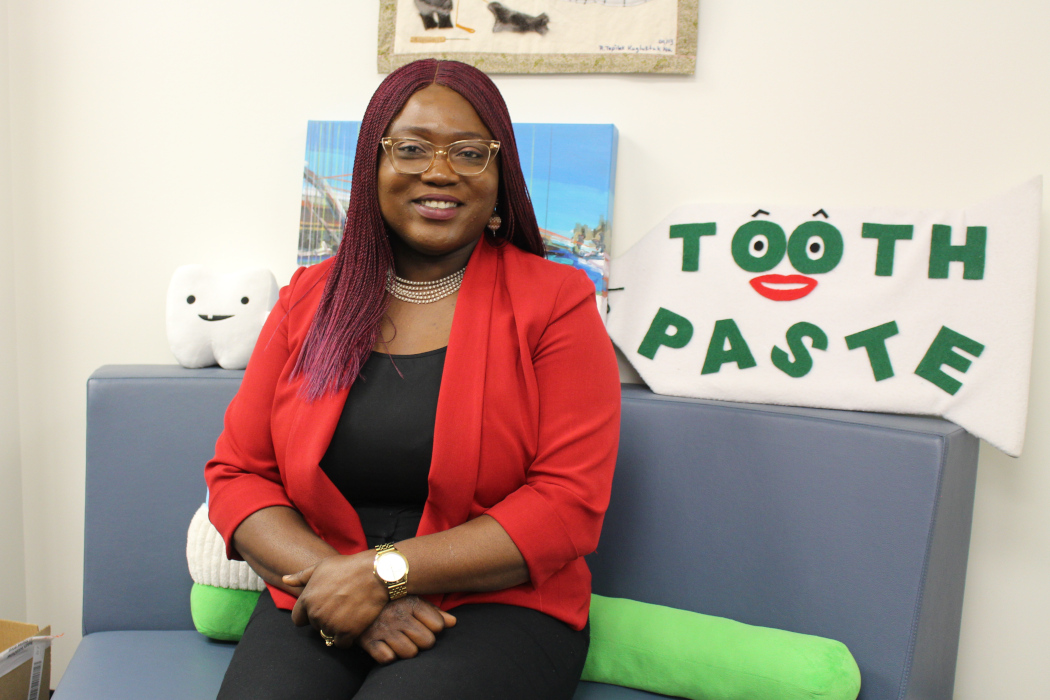
Rady grad student profile: Dr. Olubukola Olatosi passionate about early childhood oral health
Dr. Olubukola Olatosi’s PhD research combines her passion for pediatric dentistry with public health.
The second-year PhD student in oral biology at the Dr. Gerald Niznick College of Dentistry is currently focused on interviewing non-dental primary care providers about their use of the Canadian Caries Risk Assessment Tool.
The tool was created by her supervisor, Dr. Bob Schroth, a professor of preventive dental science at UM’s dental school, to help doctors, daycare workers, dieticians and social workers identify whether a child under six years old is at risk of tooth decay.
Olatosi, who completed her dentistry degree and a master’s in public health at the University of Lagos in Nigeria, has been hearing positive feedback from the non-dental primary care providers she’s interviewed so far. She said they see the tool is needed because tooth decay is endemic in children in underserved communities, and they are happy that the tool is simple and easy to use.
UM Today sat down with Olatosi to learn about what motivates her and her experience as a PhD student at UM.
What drew you to the field of oral biology?
My background is in pediatric dentistry and oral biology is the foundation for dentistry. Everything you do in dentistry starts with oral biology – from the cells to tooth decay, it’s all embedded in oral biology. I’ve always had a passion for promoting oral health care, especially to underserved populations.
You won the People’s Choice Award at this year’s UM Three Minute Thesis (3MT) final. What was it like to win and what did you learn from participating in the 3MT competition?
I’m glad I participated in 3MT because it helped give my research a platform. It helped give a voice to what I’m doing and what we’re doing in our lab. The head of my department, Dr. James Gilchrist, encouraged me to take part and said, ‘I think you can do this.’ I didn’t think I could. Participating in 3MT has motivated me to say, ‘There’s nothing you put your mind to that you cannot do.’ The format of the competition challenged me in an exciting manner and boosted my public speaking skills.
You recently received $17,850 in funding from Research Manitoba for a project titled Exploring strategies for implementing a culturally informed caries risk assessment tool used by non-dental primary care providers for young First Nations and Métis children in Manitoba, Canada. What are your thoughts on receiving this funding?
It’s so amazing. One of the things I love about the University of Manitoba is that there are so many opportunities for scholarships and funding. There is so much support, and being an international student, this is going to go a long way for me. Apart from the Research Manitoba funding, I also received the University of Manitoba Graduate Student Association Award ($16,000) and the Canadian Health Measure Survey Oral Health Component Trainee award in 2022. These awards have given me a lot of motivation to continue to work hard.
What else motivates you to do the work you do?
I’ve always had a passion to care for children. It’s always been what I love to do. Children sometimes go through pain because of their teeth and parents may not know the severity of pain they’re going through. I want to raise awareness that this problem is preventable. Children don’t deserve to be in pain. We want kids to have a healthy smile for life.
Why did you choose UM for your PhD?
The type of research I was interested in doing is happening at the University of Manitoba, which is early childhood oral health. The University of Manitoba has one of the globally-renowned experts, Dr. Robert Schroth, who is well cited and highly visible in the scientific community. I was citing him before joining his lab when I was doing my master’s. I wanted to be trained by him.
What has been most rewarding during your time at UM?
Being part of 3MT and being voted the People’s Choice Award winner was really rewarding. Receiving the Research Manitoba award and being the recipient of the University of Manitoba Graduate Students Association Award was amazing. Also, It’s not only about academics. I’ve been involved in community work with the Healthy Smile Happy Child program. I’ve been going to schools and community events promoting child oral health and giving back to the community. Also, I currently serve as one of the event executives of the Rady Faculty of Health Sciences Women in Science: Development, Outreach and Mentorship (WISDOM) trainee program and that has been rewarding. I’m able to be part of this community and give back. I’m also currently the oral biology student councilor. There are a lot of platforms if you want to do something at UM.
What are your plans once you finish your PhD?
My plan is to remain in academia, research and continue to promote protocols and guidelines that will enable significant improvement in the prevention of dental caries for children, especially in underserved communities in Canada and globally. I wish to thank my supervisor Dr. Robert Schroth, Dr. James Gilchrist, Dr. Prashen Chelikani, Dr. Raj Bhullar, my advisory committee, Erin Langford, members of Schroth Lab and dean of the Dr. Gerald Niznick College of Dentistry Dr. Anastasia Kelekis-Cholakis for their continuous support.
This Q&A is part of a series on UM Today this summer featuring Rady Faculty of Health Sciences graduate students. You can find more grad student profiles here: #Radygradstudents.






